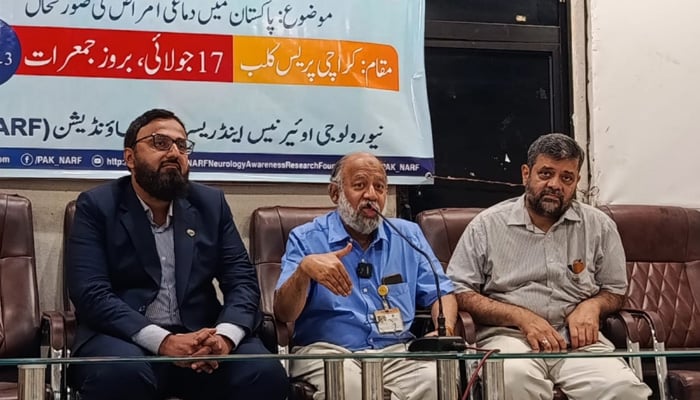15% of Pakistani youth suffer from mental health disorders: expert
"Mental health is fundamental human right and must be prioritised at every stage of life," says Dr Wasay
July 17, 2025

One of Pakistan's top neurologists, Dr Muhammad Wasay, said on Thursday that 15% of Pakistan's youth are suffering from mental health disorders.
On the occasion of World Brain Day 2025, a press conference was held on Thursday at the Karachi Press Club, in which renowned neurologists and health experts emphasised that mental health is not merely the absence of disease, but the foundation of a positive, dignified, and well-balanced life.
This year's theme for World Brain Day is "Brain Health and Wellbeing: A Priority for All". According to global statistics, 43% of the world's population suffers from some form of neurological or mental disorder.
Other experts said that stroke cases have doubled compared to the past ten years.

"Only 400 neurologists available across the country," said Narf President Dr Wasay, adding that there's no infrastructure for neurological or psychiatric care in district hospitals and basic health units.
He stated: "Mental health is a fundamental human right and must be prioritised at every stage of life. Unfortunately, in our society, mental illnesses are still considered a stigma, leading to patients being deprived of timely treatment."
He added that the theme of World Brain Day 2025 underlines the importance of brain health from childhood to old age. "Recognising mental health as a basic human right is essential for building a healthy and productive society," he stressed.
Narf General Secretary Professor Dr Abdul Malik highlighted that 43% of the global population is affected by some form of neurological illness.
"This is not just a number — it represents a serious challenge for every family," he said. "We want the message of World Brain Day to be clear: brain health must be taken care of not just after illness strikes, but proactively."
He further noted: "Adopting a balanced diet, controlling blood pressure and diabetes, and embracing a positive lifestyle can greatly reduce the risk of neurological diseases.
"In developing countries like Pakistan, factors such as poor maternal and child health, environmental pollution, and lack of immunisation increase the risk of neurological conditions in children. Access to rehabilitation, physiotherapy, and special education must be made widespread and affordable."
Leading neurologist Dr Wajid Jawaid emphasised the need for collaborative efforts.
"Promoting mental health requires joint action from the government, medical professionals, media, and the public. Encouraging positive thinking, physical activity, and social connections can help prevent depression, anxiety, and other mental health challenges."
He added: "World Brain Day is a reminder that brain health is the foundation of a prosperous, strong, and dignified society. Women and children are particularly vulnerable to mental health issues. Nutritional deficiencies during pregnancy, poverty, and social pressures severely impact the neurological development of both women and children."
During the event, health experts called on the government to take concrete steps, including:
- Timely diagnosis of neurological disorders and elimination of associated superstitions
- Dissemination of information in simple language accessible to all segments of society
- Provision of affordable and quality treatment and rehabilitation services
- National-level promotion of neurological healthcare and research
The Narf also appealed to the public to pledge on this World Brain Day 2025 to protect their brain health through balanced nutrition, timely treatment, a healthy lifestyle, and a positive outlook — because a healthy brain is the foundation of a healthy society.











